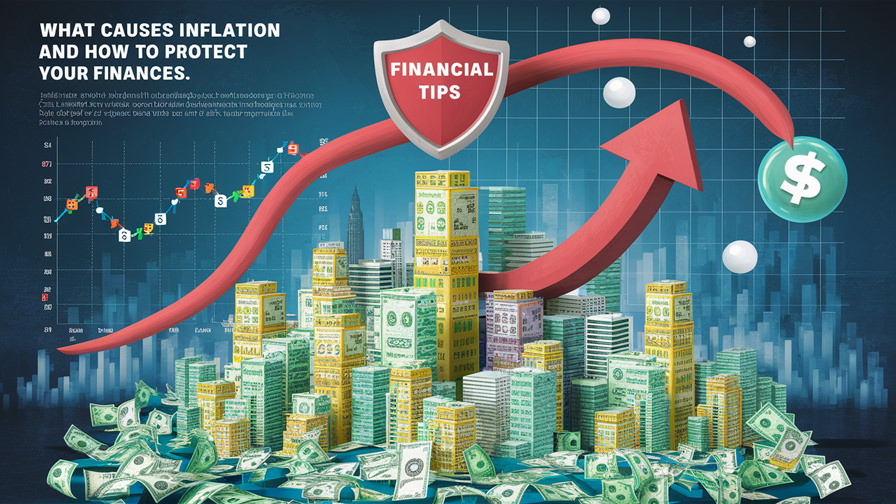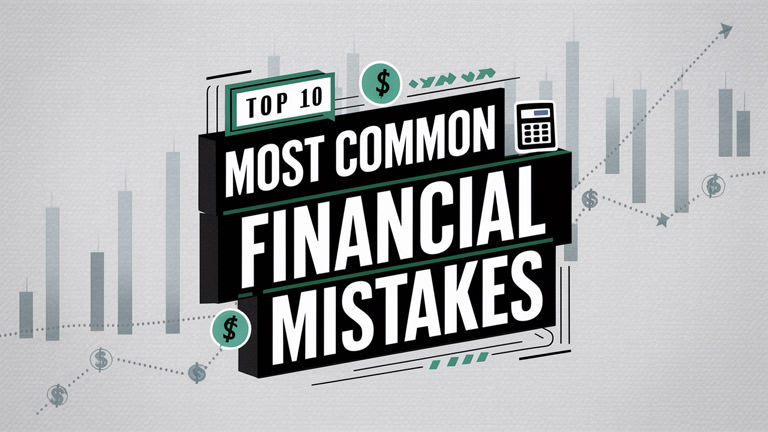Inflation is a critical economic concept that influences everything from the cost of living to the value of investments. Understanding the causes of inflation and how to shield your finances from its impact is essential for maintaining financial stability. Let’s dive into what drives inflation and practical strategies to safeguard your wealth.

What Causes Inflation?
Inflation occurs when the prices of goods and services increase, reducing the purchasing power of money. Several factors contribute to inflation, each playing a unique role in the economy.
1. Demand-Pull Inflation
Demand-pull inflation arises when consumer demand for goods and services exceeds supply. When more money circulates in the economy, and people are willing to spend more, prices tend to rise. Economic growth, increased consumer spending, and government policies such as tax cuts can drive demand-pull inflation.
2. Cost-Push Inflation
Cost-push inflation happens when the costs of production rise, prompting businesses to increase prices to maintain profit margins. Key drivers include higher costs for raw materials, rising wages, and increased production expenses. For example, if oil prices surge, transportation and manufacturing costs also rise, leading to higher consumer prices.
3. Built-In Inflation
Built-in inflation is tied to adaptive expectations. When workers and businesses expect future price increases, they demand higher wages and set higher prices to compensate. This expectation creates a cycle of wage-price inflation, where increased wages lead to higher production costs, which are then passed on to consumers as higher prices.
4. Monetary Policy
Central banks, like the Federal Reserve, influence inflation through monetary policy. Increasing the money supply can lead to higher demand for goods and services, pushing prices up. Conversely, reducing the money supply can help control inflation. Interest rate adjustments also play a role, as lower rates can stimulate borrowing and spending, while higher rates can cool an overheated economy.
5. Exchange Rates
Exchange rate fluctuations can cause inflation. If a country’s currency depreciates, the cost of imported goods rises, contributing to higher overall prices. For instance, a weaker US dollar makes imported products more expensive for American consumers, fueling inflation.
How to Protect Your Finances from Inflation
Inflation can erode your purchasing power, but several strategies can help protect your finances and maintain your financial health.
1. Invest in Assets that Outpace Inflation
Investing in assets that typically outperform inflation is crucial. Stocks, real estate, and commodities like gold often provide returns that exceed the inflation rate. By diversifying your portfolio to include these investments, you can preserve and grow your wealth.
2. Consider Inflation-Protected Securities
Inflation-protected securities, such as Treasury Inflation-Protected Securities (TIPS), are designed to shield investors from inflation. The principal value of TIPS adjusts with inflation, providing a reliable hedge against rising prices.
3. Diversify Your Investments
Diversification is essential for managing risk and enhancing potential returns. By spreading investments across various asset classes, you can mitigate the impact of inflation on your portfolio. Consider including stocks, bonds, real estate, and commodities to balance risk and return.
4. Adjust Your Budget
Regularly reviewing and adjusting your budget can help you stay ahead of inflation. Focus on reducing discretionary expenses and finding ways to save on essentials. Strategies like buying in bulk, using coupons, and shopping during sales can help manage costs effectively.
5. Increase Your Income
Boosting your income can help offset the effects of inflation. This could involve asking for a raise, pursuing further education or training for higher-paying jobs, or starting a side business. Higher earnings can help you keep up with rising prices and maintain your standard of living.
6. Maintain an Emergency Fund
An emergency fund acts as a financial safety net during economic uncertainties. Saving three to six months’ worth of living expenses can provide a cushion against inflationary pressures and unexpected costs.
Conclusion
Inflation is an inevitable part of the economic cycle, but understanding its causes and impacts can help you take proactive steps to protect your finances. By investing wisely, diversifying your portfolio, adjusting your budget, increasing your income, and maintaining an emergency fund, you can safeguard your purchasing power and secure your financial future. Stay informed about economic trends and continuously adapt your strategies to ensure long-term financial stability.
Willie McClellan is a financial analyst and personal finance expert with over 15 years of industry experience. Holding a Master’s degree in Finance from the University of Chicago, Willie has worked with top investment firms, providing insights on market trends and investment strategies. He is passionate about financial education and regularly contributes to leading financial blogs and magazines. When not working, Willie enjoys hiking and spending time with his family.



